TL;DR
- SaaS accelerates startup growth with lower costs, fast deployment, and scalable pricing.
- Key selection factors: budget, integrations, security, scalability, and UX/support.
- Top 2025 tools: Flatlogic, Notion, HubSpot, Zapier, Airtable, Monday, Slack, ClickUp, Salesforce, Figma.
- Trends to watch: AI automation, no/low-code platforms, enhanced cybersecurity, and flexible pricing.
Fact Box
- Gartner: 80% of businesses using SaaS tools saw increased productivity.
- Forrester: cloud-based solutions can cut operational costs by up to 30%.
- Flatlogic says its team has built over 1,500 applications across startups, SMBs, and enterprises.
- Zapier connects over 5,000 popular apps for no-code workflow automation. Source
- Flatlogic Generator lets users generate apps in minutes and automates GitHub-based version control. Source
Want to give your startup an edge in 2025? The right SaaS tools can make or break your business, helping you automate workflows, boost efficiency, and scale faster than ever. But with so many options available, how do you know which ones truly deliver? Read on to discover the essential tools every startup needs this year.
When searching for the best SaaS tools, you’re probably asking:
- Which software will help my startup grow the fastest?
- How can I automate tasks without hiring a huge team?
- What are the must-have tools for collaboration, security, and customer management?
- Are there any affordable SaaS tools for early-stage startups?
As Marc Andreessen, co-founder of Andreessen Horowitz, famously said: “Software is eating the world.” In 2025, that’s more true than ever – startups that leverage the best SaaS solutions gain a competitive advantage, while those that don’t risk falling behind.
A recent study by Gartner found that 80% of businesses using SaaS tools saw increased productivity, and Forrester reports that cloud-based solutions can reduce operational costs by up to 30%. Yet, many startups struggle with tool overload, choosing the wrong software, or missing out on game-changing automation.
As a team that has built over 1,500 applications and worked with startups, SMBs, and enterprises, we understand what it takes to pick the right SaaS tools. Flatlogic has been at the forefront of AI-driven software development, helping businesses streamline their app-building process. Our expertise in SaaS solutions means we know which tools deliver results.
By the end of this article, you’ll know the top SaaS tools for startups in 2025, categorized by function, key features that matter when choosing software, and how to integrate the right tools into your workflow for maximum efficiency.
Let’s dive in and find the best SaaS tools for your startup! 🚀
What are SaaS Tools?
SaaS (Software as a Service) tools are cloud-based software applications that allow users to access services through the internet without requiring installation or maintenance on local devices. These tools offer functionalities across various domains, including project management, communication, finance, security, and more. 
Startups benefit from SaaS tools because they provide cost-effective, scalable, and easily deployable solutions that help streamline operations, reduce infrastructure costs, and improve team productivity.
Why Startups Need SaaS Tools
SaaS tools are indispensable for startups aiming to grow quickly and efficiently. These cloud-based solutions allow businesses to operate without the burden of heavy infrastructure investments and long setup times. Instead, they provide instant access to tools that support collaboration, automation, and seamless integrations with other systems. Startups that adopt SaaS tools early can achieve higher productivity, better financial management, and improved customer relationships.
SaaS tools enable startups to:
- Reduce Costs: No need for expensive hardware, software licenses, or IT maintenance teams.
- Scale Easily: Most SaaS solutions offer scalable pricing plans that grow with the business.
- Enhance Productivity: Automated workflows, real-time collaboration, and AI-driven insights improve efficiency.
- Improve Security: Cloud-based solutions provide data encryption, compliance features, and regular security updates.
- Integrate Seamlessly: Many SaaS tools integrate with other applications, creating a connected and efficient workflow.
Advantages of SaaS Tools for Startups
When compared to traditional software solutions, SaaS tools offer multiple advantages. These benefits help startups streamline operations, cut costs, and improve collaboration. Below are the primary reasons why SaaS tools are preferable:
1. Cost-Effectiveness
SaaS tools operate on a subscription model, eliminating upfront hardware and software costs. This allows startups to access premium features without large initial investments.
2. Automatic Updates and Maintenance
Providers handle software updates and maintenance, ensuring that startups always have access to the latest features without IT overhead.
3. Flexibility and Accessibility
Cloud-based SaaS tools allow users to work from anywhere with an internet connection, which is essential for remote teams and digital-first businesses.
4. Security and Compliance
Top SaaS providers offer robust security features such as data encryption, multi-factor authentication, and compliance with industry standards like GDPR and SOC 2.
5. Faster Deployment
Since SaaS tools don’t require installation, businesses can implement them quickly and start using them immediately, accelerating business growth.
Key Considerations When Choosing SaaS Tools
Selecting the right SaaS tools is critical to maximizing efficiency and productivity. Startups must evaluate their options carefully to ensure they align with their business needs and long-term goals. Below are the key factors to consider when choosing SaaS tools:
- Budget and Pricing Plans. Startups should evaluate the cost of SaaS tools, considering free versions, trial periods, and long-term affordability.
- Integration Capabilities. Tools that integrate seamlessly with existing software stacks improve workflow efficiency and reduce redundancy.
- Customization and Scalability. SaaS tools should allow businesses to customize features and scale as they grow.
- User Experience and Support. User-friendly interfaces and reliable customer support are essential for quick onboarding and troubleshooting.
- Security and Compliance. Startups handling sensitive data should ensure that SaaS tools meet industry security standards and regulatory requirements.
SaaS Trends to Watch in 2025
The SaaS landscape continues to evolve, with new technologies enhancing efficiency, security, and personalization. Startups should be aware of these emerging trends to remain competitive.
- AI-Powered Automation
- AI-driven automation in SaaS tools will continue to improve efficiency, reducing manual tasks and enhancing decision-making processes.
- No-Code and Low-Code Solutions
- More startups will leverage no-code and low-code platforms to develop applications without requiring extensive programming skills.
- Enhanced Cybersecurity Features
- With increasing cyber threats, SaaS providers will focus on stronger security features, including end-to-end encryption and AI-driven threat detection.
- Subscription Model Innovations
- Flexible pricing, usage-based billing, and customizable plans will become more common, giving startups more options to fit their budget.
Future of SaaS Tools for Startups
SaaS tools are continuously evolving, incorporating advanced AI, automation, and seamless integrations to meet the changing demands of startups. The future will likely bring:
- Greater AI-Driven Personalization: Tools that adapt to users’ needs based on historical data and predictive analytics.
- Improved Collaboration Features: More immersive virtual workspaces and enhanced real-time team collaboration.
- Increased Focus on Data Privacy: Stricter security measures and compliance frameworks to address growing cybersecurity concerns.
- Deeper API Connectivity: More SaaS tools offering extensive API libraries to create custom workflows.
Top SaaS Tools For Startups in 2025
As businesses continue to embrace digital transformation, the right SaaS tools can significantly improve efficiency, scalability, and productivity. In 2025, AI-driven solutions, automation, and ease of customization will define the best SaaS tools. Here are the top SaaS tools every business should consider this year:
Flatlogic Generator – AI-Powered Business App Development
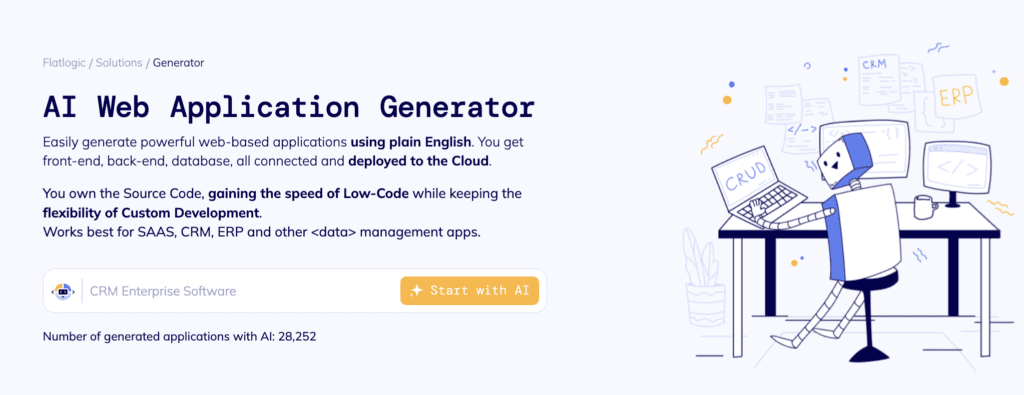
Flatlogic Generator is an AI Software Development Agent that automates and accelerates the creation of enterprise applications like ERP, CRM, and SaaS products, reducing development complexity while maintaining full flexibility. It leverages AI to automate development, reducing time and effort while ensuring high scalability. Its structure includes an AI-assisted app creation engine, a flexible customization framework, and automated version control via GitHub. Users can generate applications in minutes, modify them with full source code access, and seamlessly integrate with modern tech stacks like React, Next.js, and Node.js.
Key Benefits:
- AI-driven app generation for rapid development.
- Full code ownership for customization and scalability.
- Automated GitHub integration for version control.
- Supports multiple front-end and back-end frameworks.
Pricing:
Flatlogic Generator offers flexible pricing plans, including a free tier for basic usage, a subscription-based model for premium features, and enterprise-level pricing for larger-scale applications and businesses.
Notion – All-in-One Productivity and Collaboration Platform
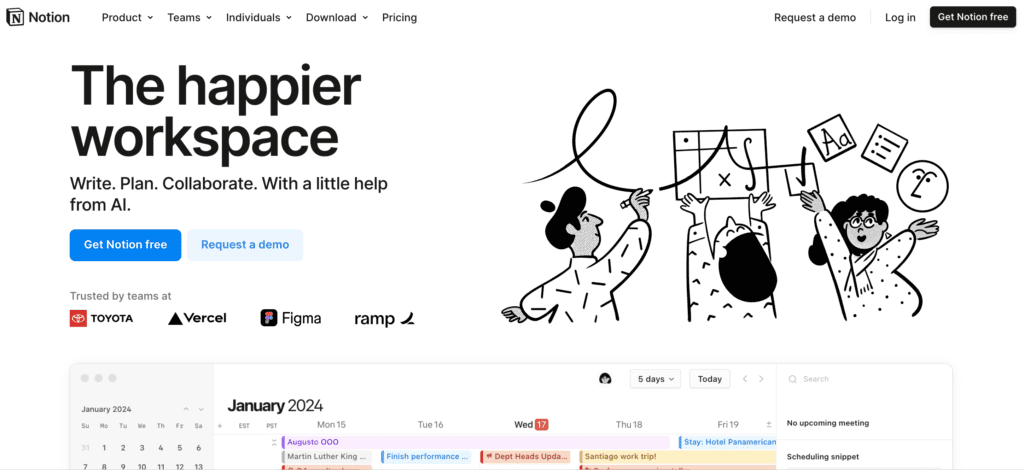
Notion provides a unified workspace that combines note-taking, documentation, project management, and database functionalities. Its AI-powered tools enhance content creation and organization, making it an essential tool for teams and individuals.
Key Benefits:
- Customizable workspace for notes, wikis, and tasks.
- AI-driven content summarization and automation.
- Seamless integrations with third-party apps.
- Real-time collaboration and document sharing.
Pricing:
Notion offers a free plan for individuals, a subscription-based model for teams, and enterprise plans with advanced security features.
HubSpot – Comprehensive Marketing, Sales, and CRM Platform
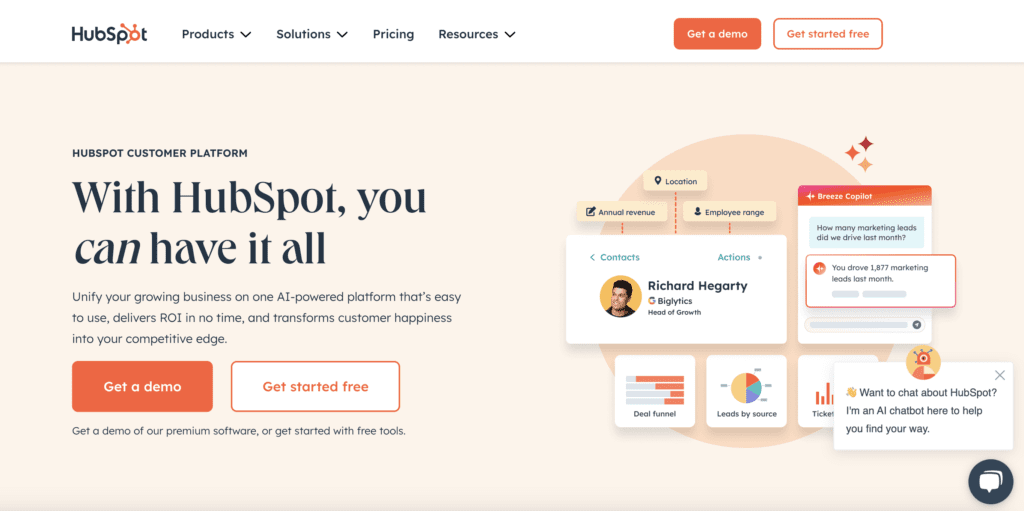
HubSpot provides an all-in-one solution for marketing automation, customer relationship management, and sales tracking. It helps businesses attract leads, automate workflows, and nurture customer relationships efficiently.
Key Benefits:
- Powerful CRM with AI-powered insights.
- Automated email marketing and lead tracking.
- Scalable sales and customer support tools.
- Seamless integration with other business tools.
Pricing:
HubSpot has a free CRM plan, with additional premium plans for marketing and sales automation tailored for growing businesses and enterprises.
Zapier – No-Code Workflow Automation
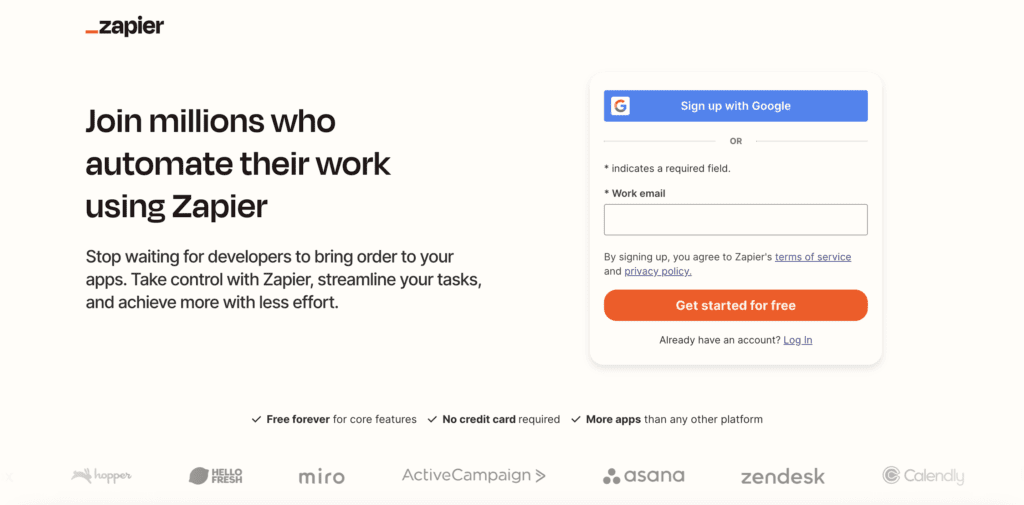
Zapier enables businesses to connect apps and automate workflows without any coding. By linking different SaaS tools, users can create complex automation sequences that save time and increase efficiency.
Key Benefits:
- No-code automation for repetitive tasks.
- Connects over 5,000 popular apps.
- AI-powered workflow optimization.
- Custom triggers and multi-step automation.
Pricing:
Zapier provides a free tier with limited actions, a subscription-based plan for professionals, and enterprise solutions for large-scale automation.
Airtable – Hybrid Spreadsheet-Database for Teams
Airtable combines the simplicity of spreadsheets with the flexibility of a database, allowing businesses to manage structured data efficiently. It’s widely used for project tracking, content planning, and data organization.
Key Benefits:
- Intuitive spreadsheet-like interface with database power.
- Advanced filtering, sorting, and linking capabilities.
- Customizable workflows and automation tools.
- Integration with external apps and services.
Pricing:
Airtable offers a free plan for basic usage, with scalable pricing tiers for businesses needing advanced features.
Monday.com – Intuitive Work Operating System
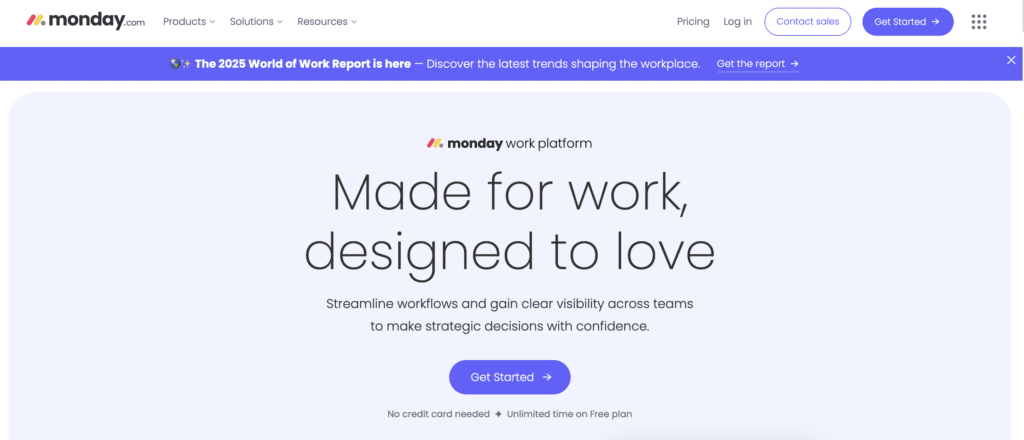
Monday.com is a flexible work management platform that helps teams plan, track, and collaborate on projects. It provides customizable workflows and AI-driven productivity tools.
Key Benefits:
- Visual project tracking with automation.
- AI-powered task management.
- Customizable workflows for any industry.
- Integration with external SaaS tools.
Pricing:
Monday.com has a free tier for small teams, along with business and enterprise plans for larger organizations.
Slack – Real-Time Communication for Teams
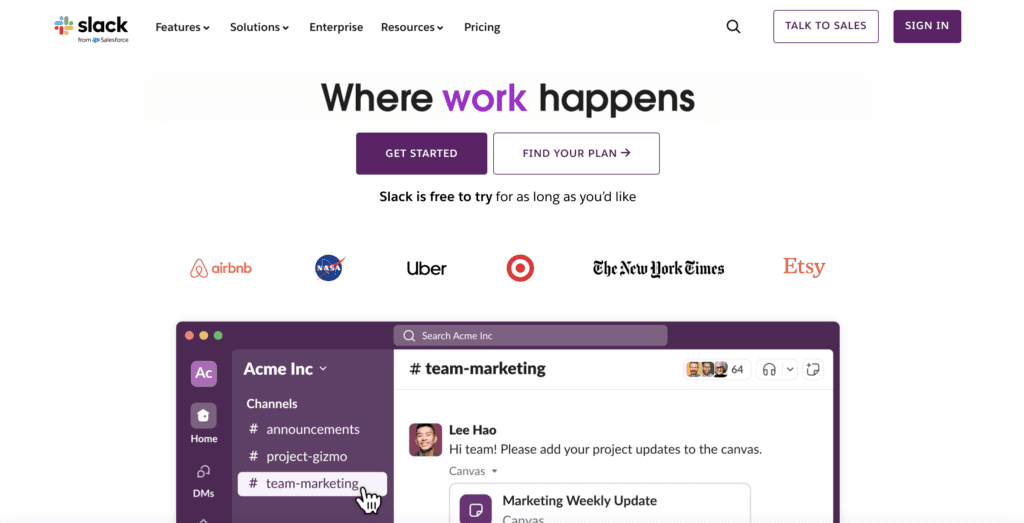
Slack is a widely adopted communication platform designed to streamline team collaboration. It offers channels, direct messaging, and AI-powered search to enhance productivity.
Key Benefits:
- Organized team communication with channels.
- AI-driven message summarization and search.
- Extensive integrations with business apps.
- Secure and scalable messaging system.
Pricing:
Slack provides a free plan with limited features, while premium plans include additional storage, integrations, and enterprise-grade security.
ClickUp – All-in-One Project Management
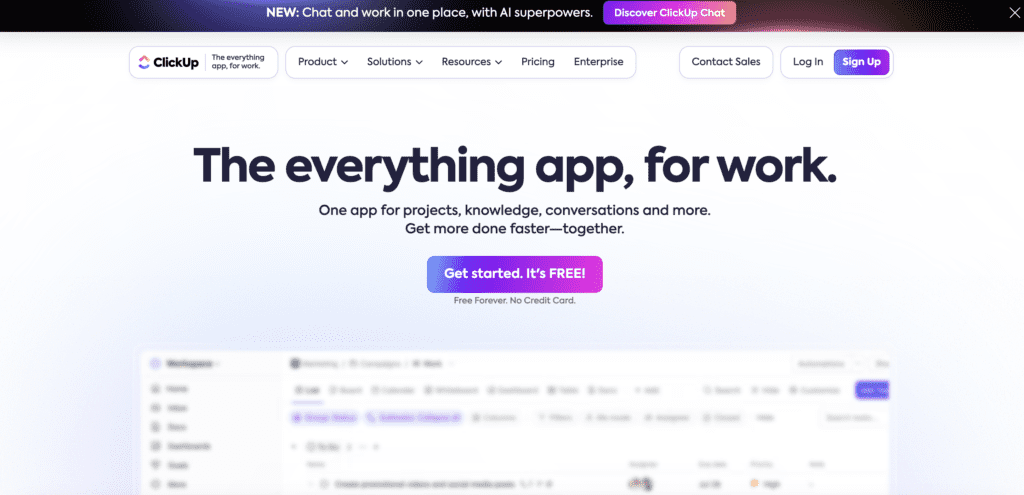
ClickUp is a feature-rich project management tool that provides task tracking, document sharing, and automation to improve productivity across teams.
Key Benefits:
- Comprehensive task and project management.
- Custom workflows and automation.
- AI-powered reporting and time tracking.
- Real-time team collaboration.
Pricing:
ClickUp offers a free plan with core features, while paid plans provide advanced capabilities for scaling businesses.
Salesforce – Enterprise CRM and Sales Automation
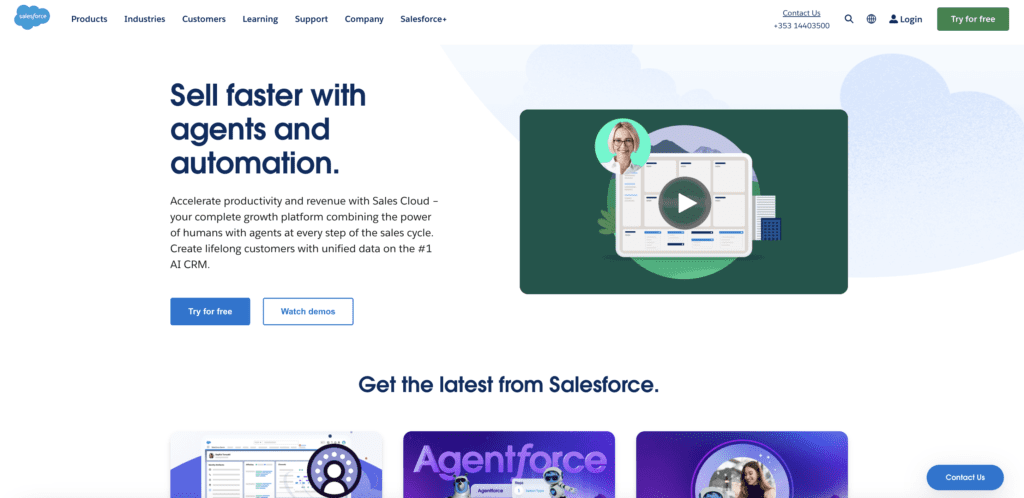
Salesforce is a leading CRM platform designed to help businesses manage sales, marketing, and customer support. Its AI-powered analytics and automation tools make it an essential tool for enterprises.
Key Benefits:
- AI-driven sales forecasting and customer insights.
- Scalable CRM for businesses of all sizes.
- Extensive third-party integrations.
- Robust automation and reporting tools.
Pricing:
Salesforce offers tiered pricing, from small business solutions to large-scale enterprise plans.
Figma – Cloud-Based UI/UX Design Platform
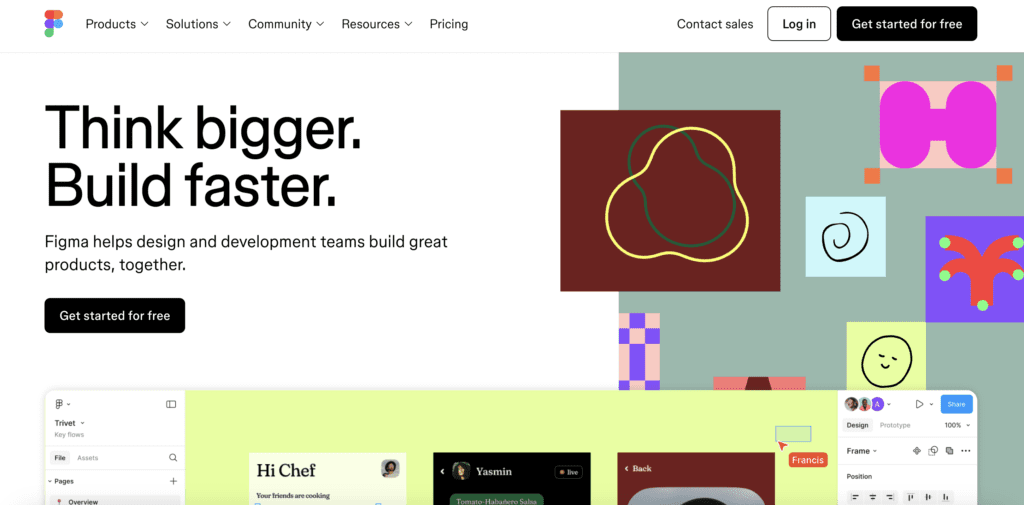
Figma is a leading design collaboration tool that allows teams to create, prototype, and share user interface designs in real-time.
Key Benefits:
- Cloud-based collaboration for UI/UX teams.
- AI-powered design tools and templates.
- Seamless version control and file sharing.
- Integration with development tools like GitHub.
Pricing:
Figma offers a free plan for individual designers, with paid options for professional and enterprise teams.
Conclusion
Choosing the right SaaS tools can significantly impact a startup’s efficiency and growth in 2025. Whether it’s for project management, marketing, security, or finance, leveraging AI-powered and automation-focused solutions can streamline operations and enhance productivity. Startups should assess their specific needs and budget before selecting the tools that align best with their goals.
Investing in the right software can lead to faster growth, improved decision-making, and overall team efficiency. As AI and automation continue to advance, integrating these tools into daily workflows will be crucial for staying competitive in an increasingly digital-first business landscape.
Flatlogic Generator simplifies app development, giving businesses full control over their applications. If you need a scalable and customizable solution, try Flatlogic Generator today.
Comments